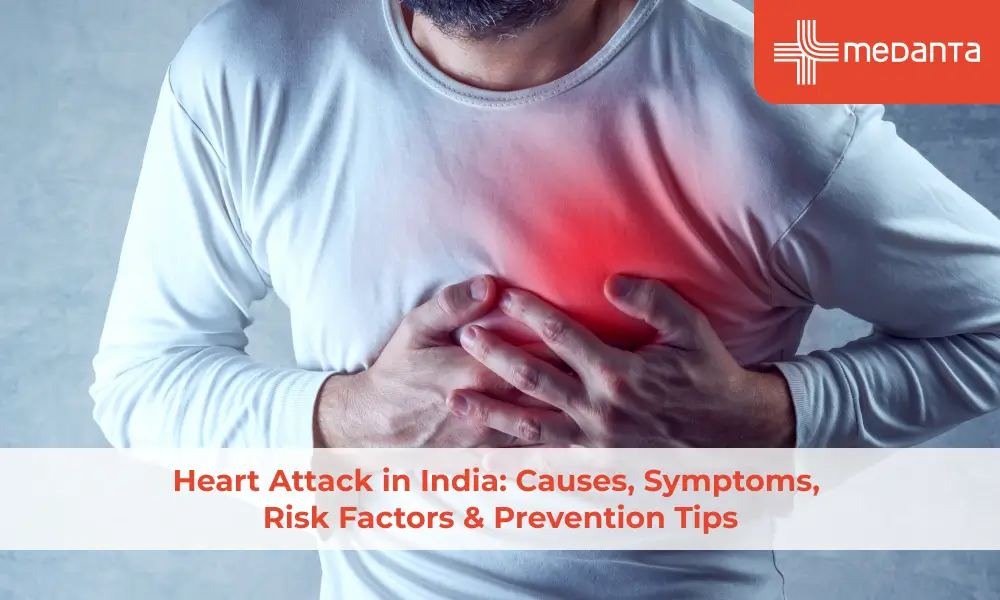Heart Attack in India: Causes, Symptoms, Risk Factors & Prevention Tips

TABLE OF CONTENTS
Introduction
Heart attack has been one of the leading causes of death in India. As per the estimate, almost 24.2% of all deaths in India are due to cardiovascular diseases. Heart attack or myocardial infarction is a major contributor. From 2014 to 2019, research shows a 50% increase in heart attack cases. The sudden deaths of celebrities like Siddharth Shukla and KK due to heart attacks have made it more crucial than ever to raise awareness and encourage lifestyle changes.
What Is a Heart Attack? | Myocardial Infarction Explained
One of the most essential muscles in the body is the heart. This is because the heart pumps blood via the circulatory system, which transports the oxygen required for living throughout the body. To function correctly, the heart requires a constant flow of oxygen-rich blood. When the heart is deprived of oxygen because of the blockage in one of the blood vessels that provide blood to the heart, a heart attack occurs. Myocardial infarction is another name for a heart attack (MI). When a coronary artery is blocked during a heart attack, blood flow to the heart is cut off, limiting the quantity of oxygen delivered to the heart. The longer the blockage goes untreated, the more harm it does to the heart. The heart muscle is eventually damaged and if it isn't treated to restore blood flow, the heart can be permanently injured.
Main Causes of Heart Attack | Why Do Heart Attacks Happen?
Coronary heart disease, also known as coronary artery disease, occurs when the blood arteries that feed blood to the heart become blocked. Atherosclerosis, a condition in which fat, cholesterol, and other chemicals pile up and form plaque in the arteries, can cause blockage. This plaque can get larger over time, narrowing the artery and causing it to harden. This lowers blood flow to the heart, depriving the heart of the oxygen it requires to operate correctly. The other heart attack causes include:
Small plaques in your arteries: They may not block your blood vessels, but can cause blood clots to form on these plaques which may obstruct blood flow
Spasm in coronary artery
Embolism: A coronary artery embolism occurs when a blood clot travels through your bloodstream and gets stuck in your coronary artery. This can block blood flow through your artery.
Spontaneous tear in your blood vessel: There is then a possibility of blood clots or a blockage of your artery if the torn tissue blocks your blood vessel.
The main risk factors that increase the chances of a heart attack are:
Diabetes mellitus
High blood pressure
Cigarette smoking
High blood cholesterol
Overweight
Physical inactivity
Age increases the risk of heart attack
History of Heart attack or coronary artery-opening procedure in the past
Family history of early heart disease
Consuming unhealthy, high fat and sodium-containing food
Heart Attack Symptoms | Early Warning Signs to Watch For
It's important to be aware of the most common heart attack symptoms and to get medical care as soon as possible if you or someone you know is experiencing them. The importance of early treatment cannot be underestimated; it might be the difference between life and death. People may suffer a single symptom or a mix of several. Typical heart attack symptoms are as follows:
Heart attacks are characterized by pain in the center of the chest that lasts for several minutes or returns after a short period of time.
A radiating pain that starts from the arms or chest can spread to the jaw, neck, or back of the body
breathing difficulties
nausea or vomiting
heartburn and stomach discomfort
light-headedness or sudden dizziness
faintness or anxiety
chilly sweats
Fatigue
Heart Attack Prevention Tips | How to Keep Your Heart Healthy
The most important aspect of avoiding a heart attack involves a series of lifestyle changes that might help your heart, blood vessels, and body to remain healthy and efficient. The keys to successfully preventing a heart attack include consuming a heart-healthy diet, avoiding any form of tobacco, and maintaining blood pressure. Below we have shared some of the important tips to prevent heart attack and keep your heart healthy
Get a daily dose of physical exercises, such as a brisk 30-minute walk
Prepare low-sodium and low-fat meals.
Take your meds as directed and attend all of your doctor's visits.
Get 7-8 hours of sleep each night.
Relax and de-stress by doing things like meditation, yoga, taking a warm bath, or spending time alone with a good book or a hilarious movie.
Increase your physical activity and keep nutritious foods on your hands, such as fruits and vegetables, to help you attain or maintain a healthy weight.
References
Benjamin EJ, Muntner P, Alonso A, Bittencourt MS, Callaway CW, Carson AP, et al. Heart disease and stroke statistics—2019 update: a report from the American Heart Association. Circulation. 2019;139(10):e56–528.
Fryar CD, Chen T-C, Li X. Prevalence of uncontrolled risk factors for cardiovascular disease: the United States, MD: National Center for Health Statistics
https://www.ahajournals.org/doi/10.1161/cir.0b013e31828124ad
https://www.nhlbi.nih.gov/resources/self-care-tips-heart-health






